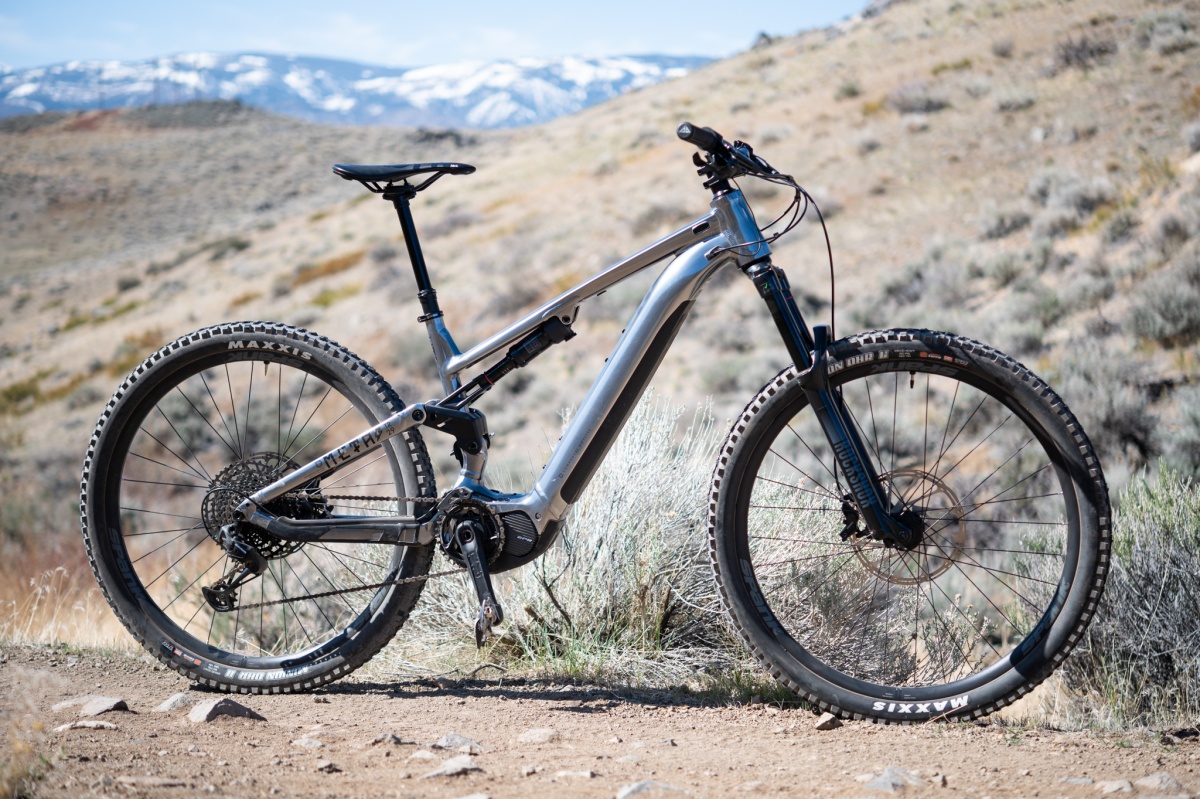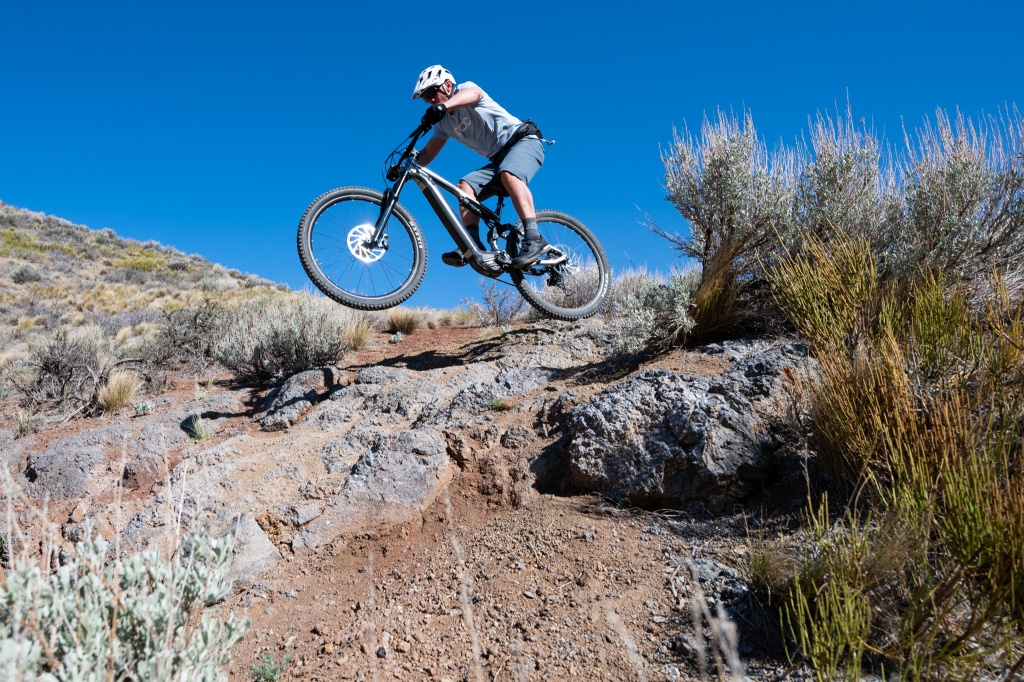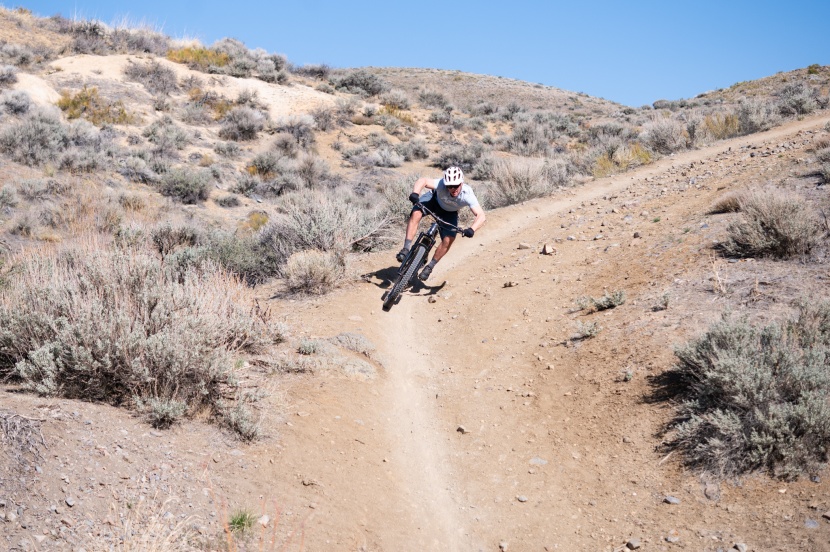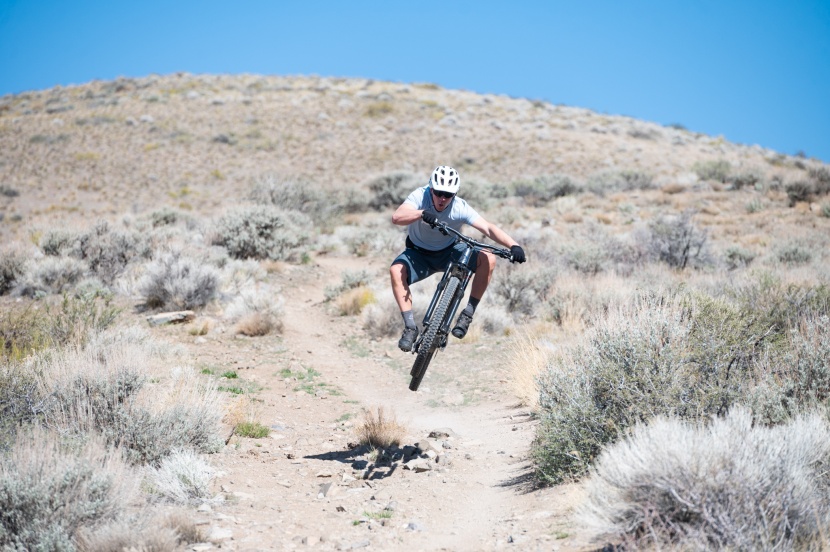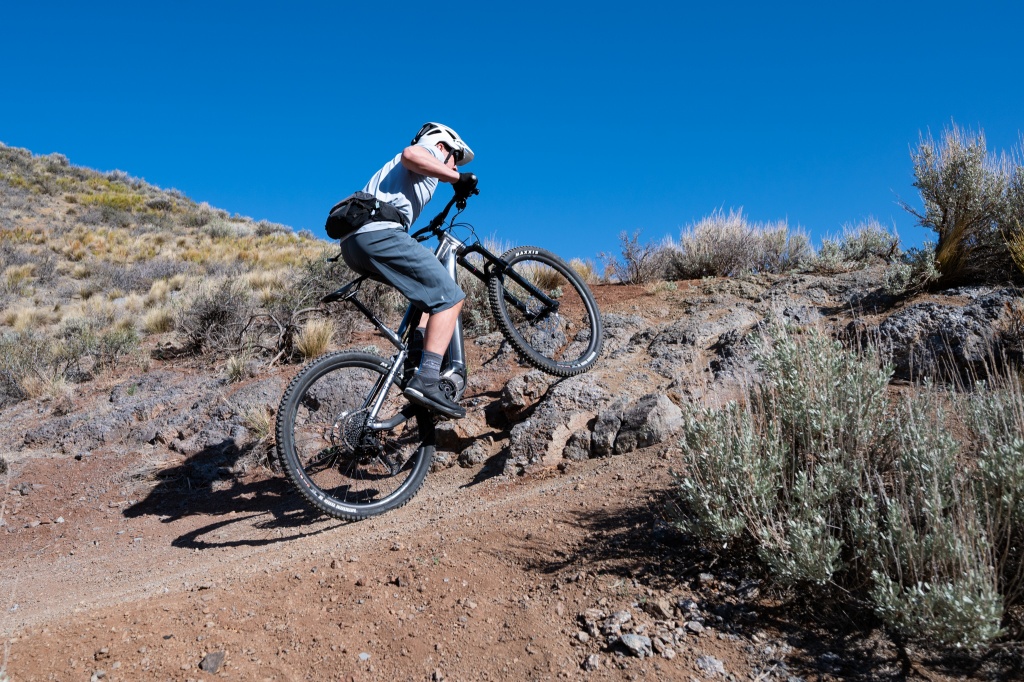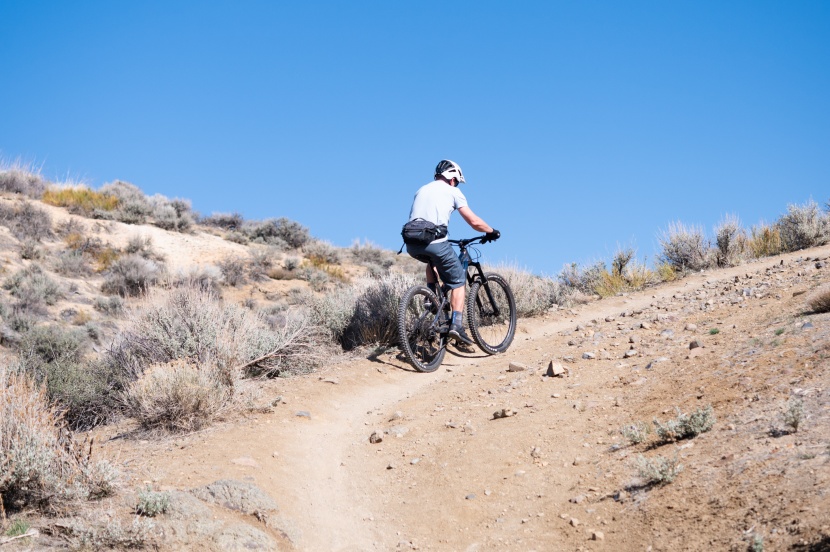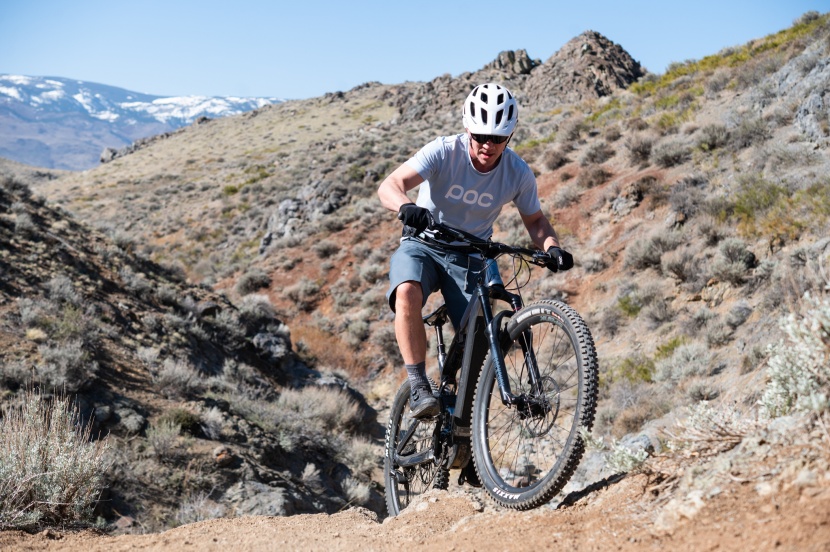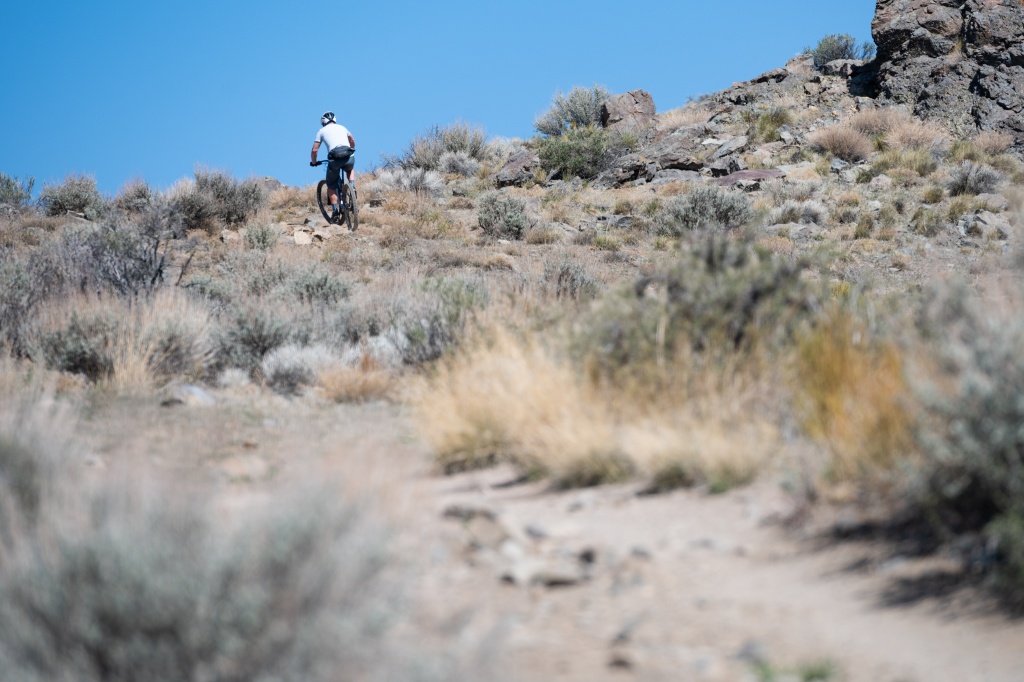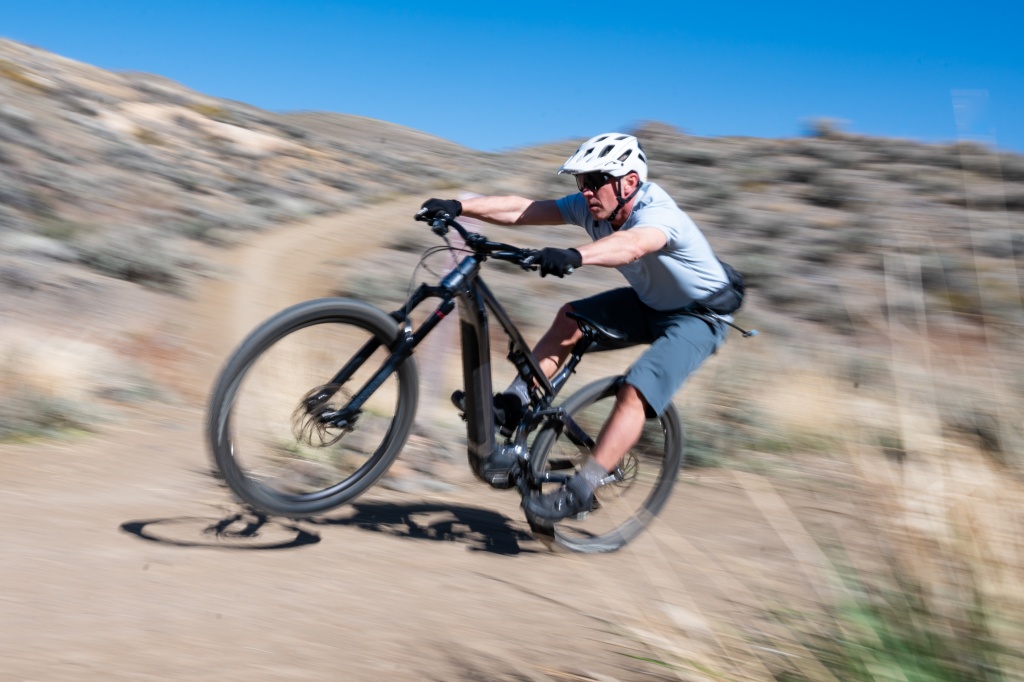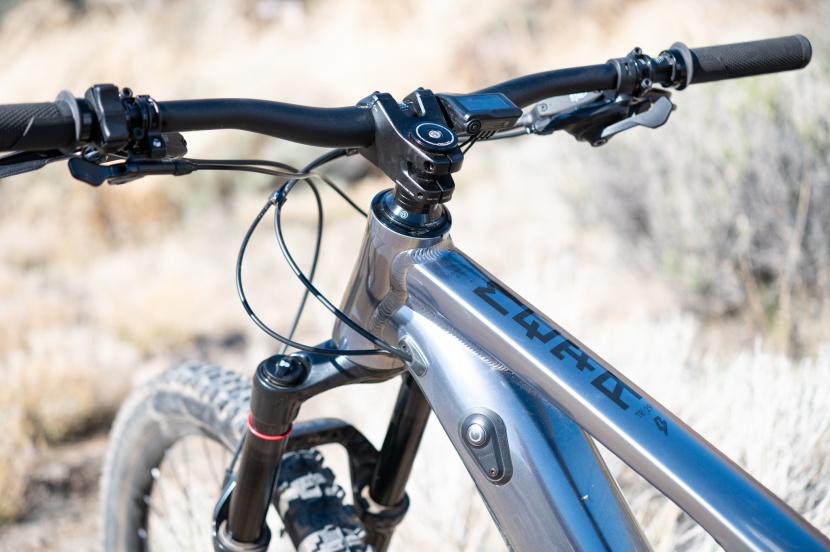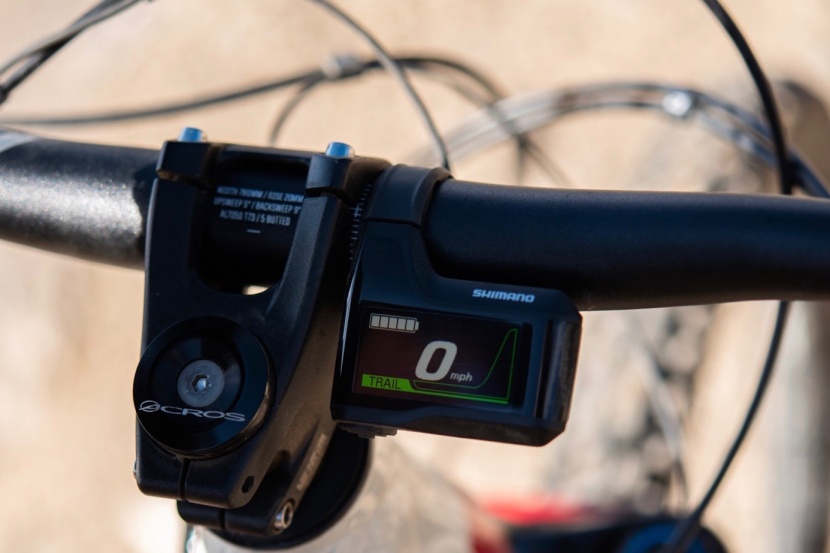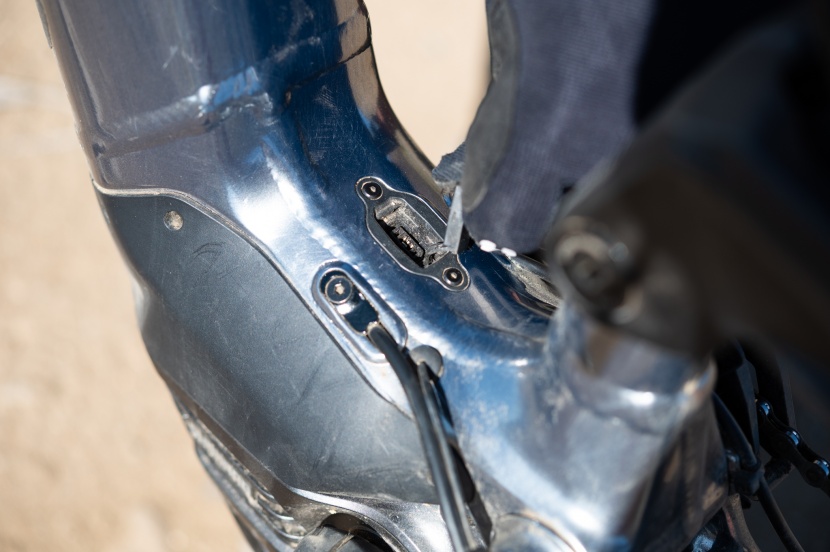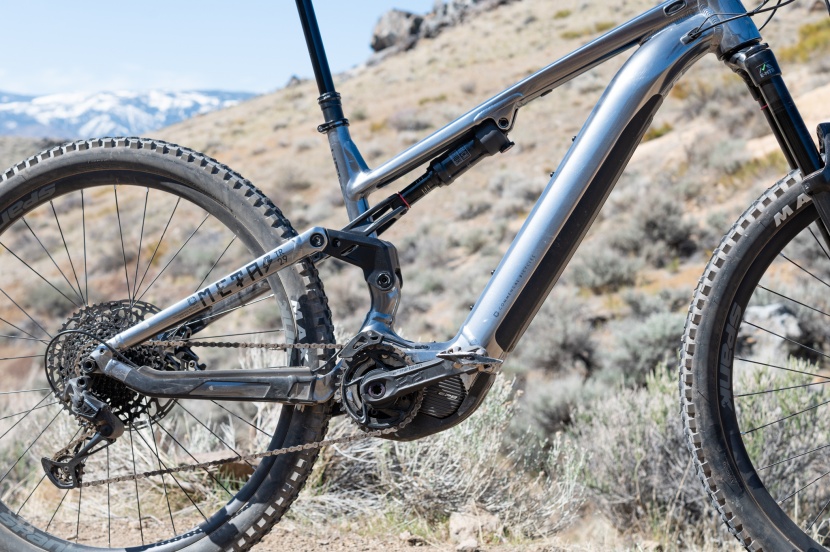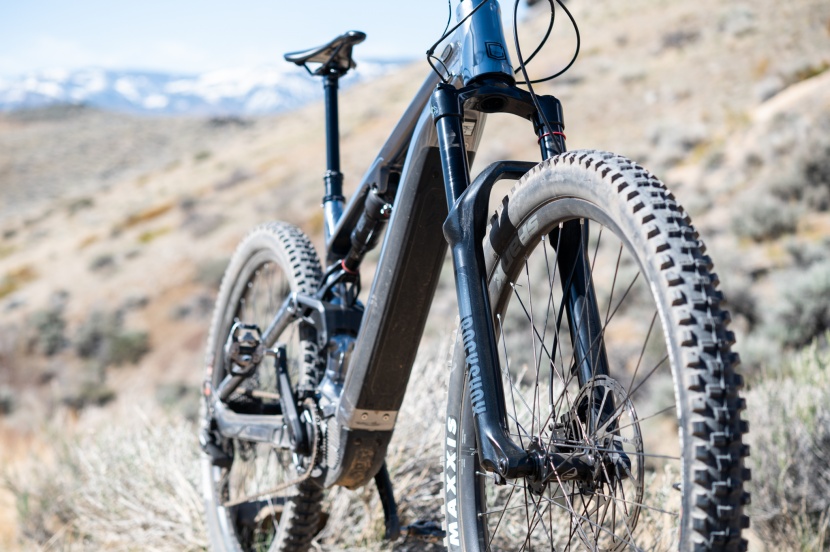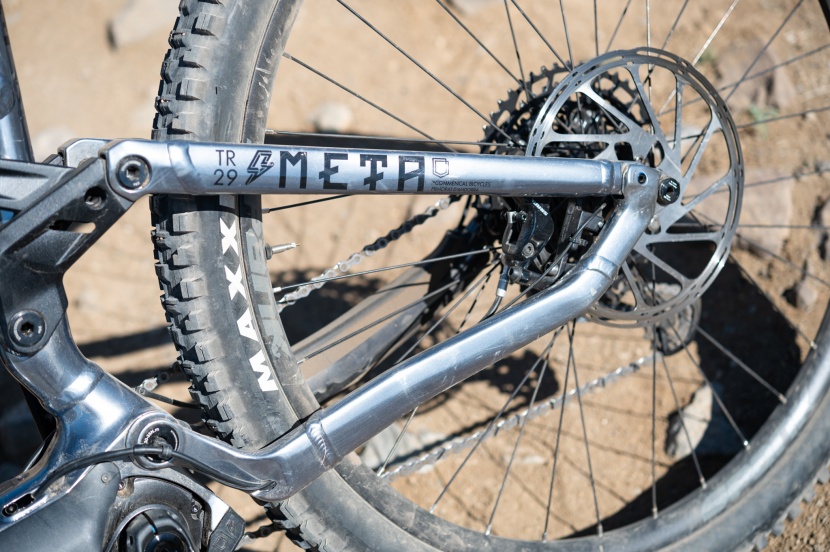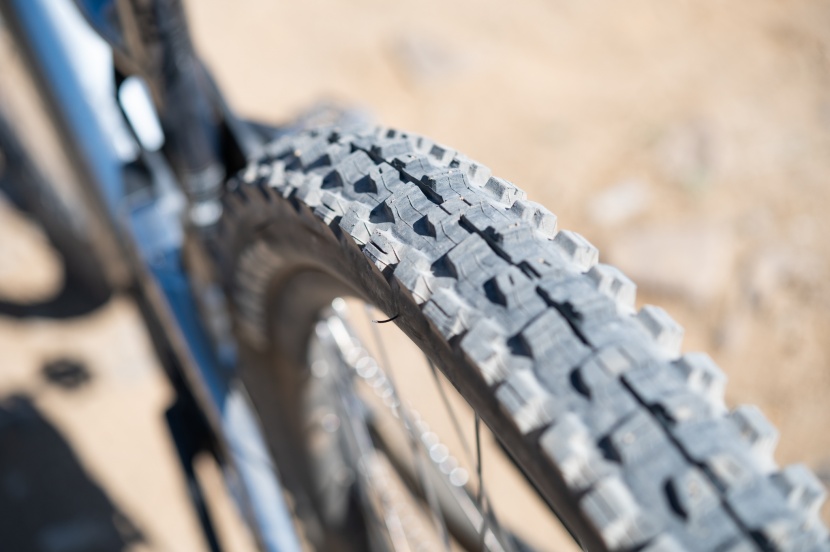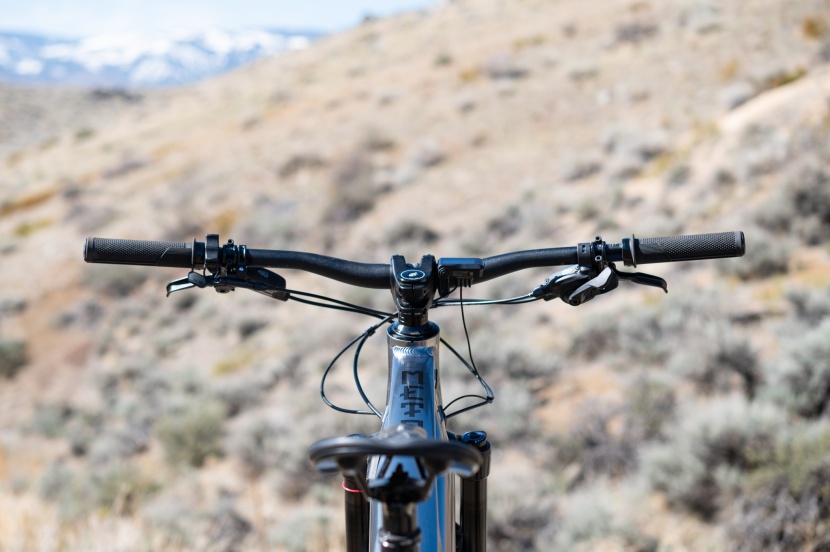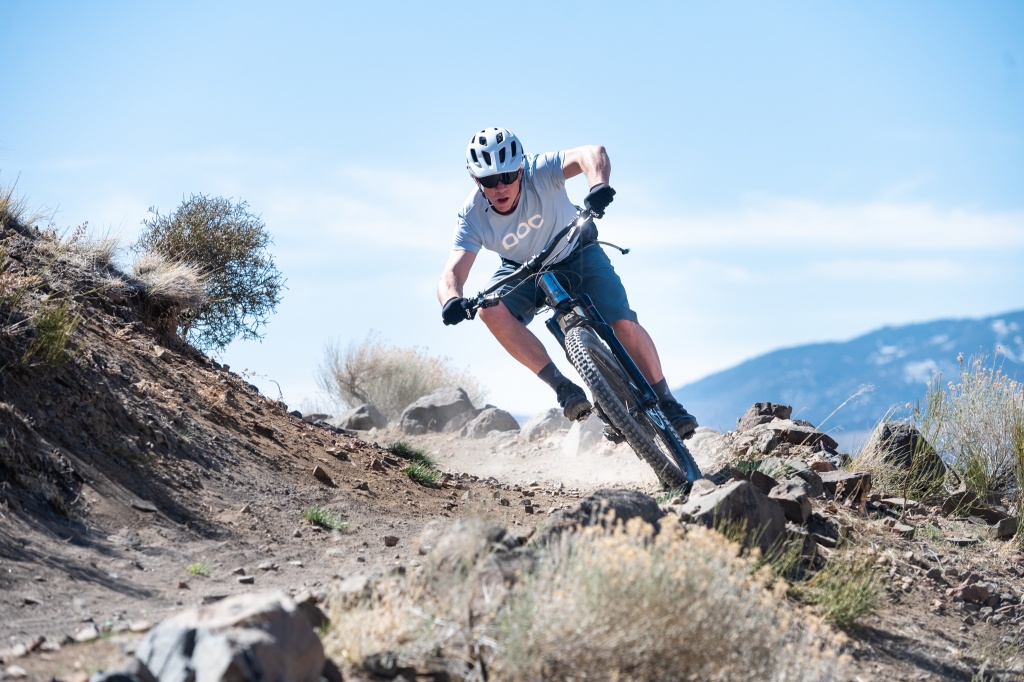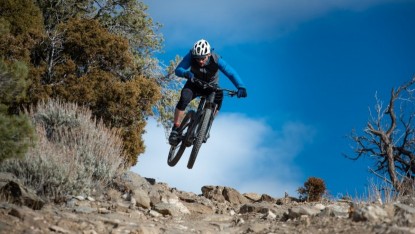
Our Verdict
Our Analysis and Test Results
Commencal is a direct-to-consumer mountain bike brand that makes everything from downhill and trail bikes to e-MTBs. In the past, we tested the more enduro-oriented Meta Power 29 Team and found it to be a beast on the descents, but its performance was pretty one-dimensional. We got our hands on the TR (trail) version to see how it compares to the rest of our field. We tested the Ride build, which is among the more affordable electric bikes on the market. While it has some low-end components, we were generally quite impressed with the performance of this versatile machine.
Downhill Performance
We found the Meta Power TR to be a versatile descender with the chops to tackle aggressive terrain with confidence and still be fun on mellower trails. It's no slacked-out enduro shred sled, but we didn't find anywhere we felt under-gunned while testing. At the same time, it remains reasonably maneuverable, considering its weight and dimensions. We feel Commencal hit an excellent middle ground where this bike is comfortable no matter what you put in front of it. Sure the suspension leaves a bit to be desired, but it performed better than we anticipated, and the rest of the build is pretty well sorted for the price.
The TR in Meta Power TR 29 stands for trail, and with 140mm of rear travel and a 150mm fork, this bike slots nicely into the do-it-all trail bike travel bracket. It's got just enough squish to handle aggressive descents and mid-sized drops, but not so much travel that it feels excessively large and one-dimensional. It remains relatively maneuverable and fun to ride on flowy trails and mellower terrain, though its 53+ lb weight does require a bit of body english in the tight stuff and at lower speeds. That weight also helps give this bike a damp, ground-hugging feel and loads of traction when leaning it over in corners. Unlike the more enduro-focused Meta Power (not TR), the TR feels more well-rounded and enjoyable on a much wider range of terrain while still being confidence-inspiring when things get steep and rough. It's not the most nimble or playful ride, but it certainly doesn't feel lethargic or boring either. Commencal's Contact System 4bar Linkage suspension design also seems pretty dialed, and it feels supple and smooth with enough progression to handle bigger hits. Impressive, given the limitations of the rear shock on the Ride build.
When diving into the Meta Power TR's geometry numbers, we were actually surprised by how versatile this bike was, given its dimensions. All sizes have the same head tube angle of 64.5-degrees, which is pretty darn slack, along with a 453mm chainstay/rear center length. Our large test bike had a 626mm effective top tube length, a 485mm reach, and a long 1,279mm wheelbase. Those numbers definitely put the TR in the long and slack category, especially for a trail bike, and are the main reason why this bike is capable of charging so hard on the descents. The slack front end, relatively long reach, and long-wheelbase position the rider confidently between the wheels, and this bike feels super damp and very, very stable at speed. It gives the rider plenty of room to move around, and this bike feels composed when rolling into something steep or chunky. Yes, all that length can feel like a bit of a handful in tight switchbacks or low-speed tech, but it felt easier to handle in those situations than we expected.
The Ride build we tested makes some compromises to keep the price of this bike affordable (for an e-bike) but performed better than anticipated on the trail. The RockShox 35 Gold fork is a notable low-point, mostly due to its limited adjustability and our poor experiences with them on other bikes. That said, the e-bike rated version on the Meta Power TR feels pretty stout and more supple than we're used to with this fork. The RockShox Deluxe Select+ rear shock is equally unimpressive but truthfully gave us little to complain about on the descents. SRAM's Guide T brakes aren't our favorite either, but the 4-piston calipers and 200mm rotors front and rear felt plenty powerful for this heavyweight bike. Commencal also thoughtfully chose some beefy rubber in the form of Maxxis Minion DHR II tires with the EXO+ casing, which provides awesome cornering and braking traction. The cockpit setup also felt good straight out of the box with a sturdy front end and long dropper post.
Climbing Performance
The Meta Power TR is a solid climber with a bit of a monster truck feel. A nice steep seat tube and the power delivered by the Shimano EP8 drive unit are the real highlights and help you blast up climbs as long as the turns aren't super sharp. This bike is certainly a bit heavy and quite long, factors that come into play at lower speeds and in tight spaces.
Power is one of the main things that help heavyweight e-bikes from feeling like boat anchors on the climbs, and the Meta Power TR has plenty on tap for this 53 lb 8 oz bike. Geometry is the other player, and this bike is long and relatively slack with a nice steep seat tube. You mix those two, and the Meta has no problem cruising uphill; it just prefers straighter lines and blasting up over obstacles in the trail. The steep seat tube angle lines the rider up nicely above the bottom bracket in a comfortable position with great power transfer. Despite the length of the wheelbase and relatively slack head tube angle, the longer chainstays and steep seat tube combine to make the front end feel planted and responsive, even on steep sections. Technical uphill puzzles and tight switchbacks are where this bike's length and weight are most noticeable, requiring a bit of forethought to ride clean. That said, it's not as unwieldy as we expected, given its numbers.
Commencal's 4-bar suspension design offers pretty good pedaling support but remains relatively active. Thanks to the pedal assistance, this results in loads of climbing traction and doesn't detract too much from the climbing experience. The RockShox Deluxe Select+ shock on the Ride build doesn't have a compression damping switch, though we certainly would have preferred one for efficiency on road climbs. The Maxxis Minion DHR II isn't the fastest rolling, but it definitely provides loads of climbing traction and works well in various conditions. The SRAM SX Eagle drivetrain isn't particularly noteworthy, but it is worth mentioning that it comes with 160mm cranks. This shorter crank length might feel a little different if you're used to 175mm cranks, but it's easy to get used to and is intended to reduce the likelihood of pedal strikes.
Interestingly, we found this bike to pedal surprisingly well without pedal assistance. Sure, it's heavy, but when the battery died on a test ride in the middle of a steep climb, the Meta was much easier to pedal to the top than we expected. In fact, we rode it for nearly 40 minutes with no assistance and were surprised by how normal it felt. There seems to be little, if any, drag in the system when the power is off. Not that most people will want to climb without any pedal assistance, but it's not terrible if you have to.
Range
With a 630Wh battery and Shimano's newer EP8 motor, the Meta Power TR impressed us with its distance range. While it can't compete with models with way larger batteries, it provides enough juice to handle most rides. We took it out for some lengthy trail rides during our test period and found that it can go the distance and rack up some serious vertical in the process.
We rode the Meta Power TR 29 for 26.1 miles with 5,321 feet of elevation gain/loss. This is impressive, but not entirely surprising, given the larger 630 Wh battery and Shimano's new EP8 motor. In the field, we had similar results. One tester was doing laps on some super steep trails and logged over 6,000 vertical feet of climbing before draining the battery. Of course, the bike's range will depend on numerous factors, including rider weight, terrain, temperature, and output setting. Still, when compared apples to apples with the other models in our test, it stands out as one of the more expensive competitors. The Shimano e-tube app also allows you to adjust the motor's output settings, which can help extend battery life.
Power Output
The Meta Power TR 29 comes equipped with Shimano's newer EP8 motor, which provides three levels of pedal assistance and a top supported speed of 20 mph. This new drive system represents an improvement over the previous generation of Shimano motors, offering more torque, reduced lag when starting to pedal, a smaller size, and a lighter weight. Overall, we feel it is a more refined system and a nice spec on the least expensive build in the range.
The Shimano EP8 motor now delivers 85Nm of torque, putting it on par with the Bosch motor of the Trek Rail and just a hair behind the 90Nm of the Brose motor in the Specialized Turbo Levo. The Meta Power TR feels plenty powerful on the trail, whether blasting along the flats or grinding up a steep climb. Power comes on right away with virtually no lag, and it hangs on for just a second once the pedals stop turning. The three pedal assist modes, Eco, Trail, and Boost, provide a nice range of support to suit the terrain or your preferences. These pedal assist settings can also be customized using the Shimano e-tube app. This feature is nice and allows you to adjust the level of assistance, max torque, and more for each mode to dial it in perfectly for your needs. Having the ability to fine-tune the support settings may not matter to everyone. Still, we really enjoyed it because we found the factory settings to be a bit too similar in Trail and Boost at higher torque levels, so we just went ahead and adjusted them.
Despite the many improvements made with the new EP8 motor, one aspect that remained largely unchanged was the noise level. I'd say it's a touch quieter than the previous version, and it doesn't have any annoying rattle coming from the housing, but it's still a bit more noticeable than the Turbo Levo, for example. It's relatively quiet in low-torque situations, although the volume ramps up with the output from the motor. We don't think it's a deal-breaker, but it's certainly not as stealthy as some other systems.
E-Bike Controls
The Meta Power TR utilizes Shimano's EP8 motor system and features the Shimano SC-EM800 display, as well as handlebar-mounted controls. This is among our favorite systems with good ergonomics and a relatively easy-to-read display mounted next to the stem. Charging is fairly standard with an easily accessible charging port.
The Meta Power TR 29 features a sizable dedicated power button on the left side of the downtube. Pressing this button turns on/off power to the motor and display. The controls are mounted on the handlebars next to the left grip. This low-profile unit has two buttons that shift up or down through the motor's pedal assist modes. These controls are streamlined with good ergonomics and are easy to reach with the thumb while riding. Activating the walk-assist mode involves pressing the bottom button until the pedal-assist is off, then pressing and holding it while you walk.
The SC-EM800 display is attached to the handlebar and positioned next to the stem in a clear and visible location. This LCD-colored display shows current speed, pedal-assist mode, and remaining battery life on the main page. Assist mode is displayed in a small font but is also color-coded to facilitate visual identification. The remaining battery life is displayed graphically with 5 bars representing the remaining battery charge that progressively turn off as the battery is depleted. A small button located at the bottom of the unit allows you to toggle through several other pages, which display information such as maximum speed, average speed, trip distance and time, estimated range, and more. We found the main page to be the most useful while riding. You can also connect via Bluetooth and the Shimano e-Tube app to customize output settings and dial everything in to your preferences. It's claimed to have improved connectivity with smartphones and GPS devices.
The Meta Power TR 29 features a standard charging cord that plugs into a small charging port located at the bottom of the down tube. This charging port has a small cover that folds up. While this system works just fine, it can require a bit of fiddling to get the cover closed, and we feel its location makes it more susceptible to ingress from water, dust, and debris. We didn't have any issues during testing, but we think it's something to watch.
Build
The Ride build of the Meta Power TR 29 we tested is the least expensive of the four builds offered. It has some notable weak points, but we found even the questionable components to perform relatively well out on the trail. Considering this is one of the least expensive eMTBs we've tested, we weren't complaining too loudly. Of course, you can also opt for one of the pricier options and get yourself into a nicer build to start with.
The suspension components are the least impressive aspect of the Ride build we tested. The RockShox 35 Gold RL fork controls the 150mm of front wheel travel and is eMTB rated. While it isn't the plushest or most tuneable fork around, it feels significantly more sturdy and supple than the non-eMTB rated versions. This came as quite a surprise to us, given its poor performance on various other bikes in the past. A simple RockShox Deluxe Select+ shock handles the 140mm of rear suspension. Again, this shock doesn't feel incredible, nor is it very tuneable, but it did its job admirably. We would have preferred a shock with a compression-damping switch for climbing, but it's not a deal-breaker with the pedal-assist power.
The Meta Power TR 29 can go pretty fast, and the 53+ lb weight of this bike requires some serious stoppers to control your speed. The SRAM Guide T brakes aren't our favorite, but the 4-piston version paired with 200mm rotors front and rear did a fine job of slowing and stopping this bike. Commencal spec'd a SRAM SX Eagle drivetrain, which is plenty easy to gripe about, but honestly worked pretty well for us during testing. It has more than enough gear range for an eMTB, but it's a bit heavy and doesn't shift under power and some other options.
One place that Commencal didn't skimp on was the ever-important tire selection. They equipped the Meta Power TR Ride with high-quality rubber front and rear tires, so you won't have to spend extra money on tires that can handle this bike's weight and downhill capabilities. A matching set of Maxxis Minion DHR II in a 2.4-inch width with the beefier EXO+ casing provides excellent cornering and braking traction. The tougher EXO+ casing also provides additional sidewall support and puncture protection needed for a heavier e-bike. Those tires are mounted to Spank Spike Race 33 rims and Formula hubs. The rims have a 30mm internal width, and they felt beefy enough to handle some big hits and chunky terrain during testing. Despite the wheels being tubeless-ready, we did have some difficulty seating the rear tire, and it required removing the pre-installed rim strip and replacing it with a double wrap of Stan's tape.
The cockpit of the Meta Power TR 29 also felt pretty dialed and ready to back up some hard shredding on this bike. Commencal spec'd several components from their house brand, Ride Alpha, including the handlebars, stem, and grips. They chose a burly freeride stem and a 780mm-wide, 20mm-rise handlebar with e-bike wire routing. This combo felt nice and sturdy, helping me when muscling this heavy bike around. At the back of the bike, a 175mm (size L and XL) KS Rage-I dropper post lowers the seat and keeps it out of the way. This dropper feels a little clunky but gets the job done. The Fabric Scoop Flat Sport saddle proved to be quite comfortable for any length of ride.
Should You Buy the Meta Power TR 29?
The Meta Power TR 29 is a versatile and hard-charging eMTB offered at a reasonable price (for an e-bike). This bike is long and slack, making it stable at speed and confident on aggressive trails, yet still loads of fun in more casual terrain. It's also a comfortable climber with a bit of a monster truck feel. Yes, it is a bit of a handful in super tight terrain due to its length and weight. The new Shimano EP8 motor is an impressive spec at this price point, and the 630Wh battery grants it an impressive range. The Ride build we tested is budget-friendly, and while there are some low points, everything came together pretty well on the trail. If you're looking for a ripping e-bike that won't break the bank, we think the Meta Power TR is a great option to consider.
What Other Electric Mountain Bike Should You Consider?
Mountain biking is an expensive sport, and adding a motor and battery to the equation only increases the price. When we purchased this bike, it cost $4,999, making it a bit of a unicorn with a price under the $5K mark. Since then, the price has increased by $800, likely due to the current surge in bike demand and supply chain-related part availability. That said, it's still one of the least expensive options on the market, and it comes with a burly frame, big battery, and quality drive system. However, if your wallet allows, the Specialized Turbo Levo Comp Alloy is a better all-around option with better performance in our tests for climbing, power output, and distance range. The Canyon Spectral:ON CF 8 is another great value, relatively speaking, with a competitive price, carbon frame, versatile trail riding geometry, a good build, and a 900Wh battery giving it a class-leading distance range.


